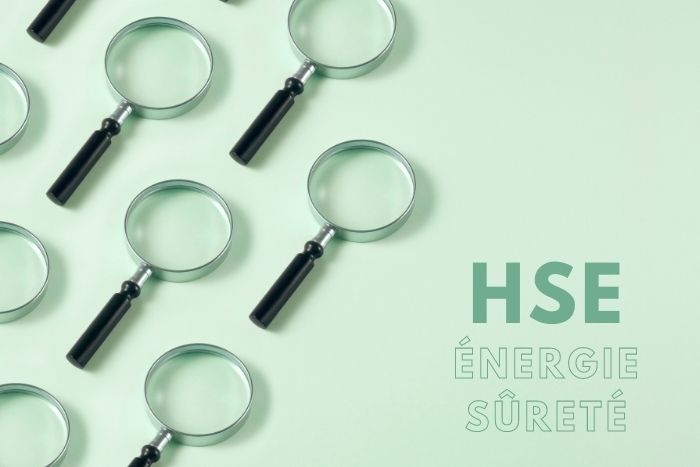We'd like to take a look at the main safety, environmental and energy regulations that came into force on January1 of this year.
New environmental regulations
Status of stored materials
(Order of October 4, 2010 - article 47 / Order of April 11, 2017 - article 1.4.I.)
As of January 1, 2022, the following are required to maintain a detailed inventory of stored materials:
- Facilities subject to registration or authorization classified 1510 (Covered warehouses);
- Seveso plants,
- Sites authorized under one of the headings 1436, 2718, 4330, 4331, 4722, 4734, 4742, 4743, 4744, 4746, 4747 or 4748.
Issue of hazardous waste tracking slips (Bordereaux de Suivi de Déchets Dangereux) via Trackdéchets
(French Environment Code - article R. 541-43)
As of January1, 2022, all hazardous waste tracking slips (BSDDs) must be entered in the "Système de gestion des bordereaux de suivi de déchets" (Trackdéchets) database, with a 6-month tolerance period (until July1, 2022).
Similarly, the issue of Bordereaux de Suivi d'Amiante (BSDA) will be mandatory via TrackDéchets from January 1, 2022, with the same tolerance period.
Issuance of Bordereaux Fluides Frigorigènes (BSFF) and Bordereaux de Déchets Infectieux (BSDASRI) via Trackdéchets will be mandatory from July 1, 2022, with a 6-month tolerance period (until January1, 2023).
Contents of the waste, excavated earth and sediment register
(Order of May 31, 2021)
The Order of May 31, 2021 setting the content of waste, excavated earth and sediment registers, from January1, 2022, comes into force. It sets out the regulatory content of waste registers, which must be kept up to date by :
- Operators of establishments producing or shipping waste, excavated soil and sediments;
- Collectors and transporters of waste, excavated soil and sediment;
- Waste, excavated earth and sediment traders and brokers;
- Operators of facilities for the transit, consolidation or treatment of waste, excavated soil and sediments;
- People recovering excavated soil and sediments;
- Persons preparing waste for reuse, recycling or other recovery operations, including when the waste ceases to be waste.
These registers are kept for at least 3 years and may be kept in paper or electronic form.
As a reminder, households and people using the public waste collection service for the waste concerned are exempt from the obligation to keep a register of waste produced or dispatched.
Extending the scope of diagnostics covering the management of products, materials and waste prior to demolition/renovation
(Code de la construction et de l'habitation - article R. 126-8)
The regulatory scope for product, material and waste management diagnostics prior to demolition/renovation has been extended.
From now on, this obligation will apply to the following demolition or major renovation projects:
- Where the total floor area of all buildings concerned exceeds 1,000 m² ;
- Those concerning at least one building that has hosted an agricultural, industrial or commercial activity and has been the site of the use, storage, manufacture or distribution of one or more substances classified as hazardous.
Prevention of plastic pellet losses
(French Environment Code - article D. 541-362)
Decree no. 2021-461 of April 16, 2021 sets out the procedures for preventing the loss of industrial plastic granules into the environment.
This is why, from January1, 2022, all operators of sites producing, handling and transporting industrial plastic granules must adopt procedures to prevent the dispersion of industrial plastic granules in the environment.
Audits of procedures must be carried out within one year of implementation, and at least every three years thereafter, under the responsibility of the operator.
Company car tax
(French General Tax Code - article 1010)
The Finance Act for the year 2021 modifies, on January1, 2022, the regulations relating to company vehicle tax. In this context, passenger vehicles used in France for the purposes of carrying out economic activities will be subject to two independent taxes rather than a single one:
- An annual tax on carbon dioxide emissions;
- An annual tax on emissions of atmospheric pollutants.
Any company liable for each of these taxes is also required to draw up an annual summary statement of the vehicles it uses and which fall within the scope of the tax.
This statement must be up to date by the date of the declaration at the latest, and must be made available to the authorities on first request.
Provisions expiring on January1, 2022 in Environment
Request for anteriority under heading 1510 of the ICPE nomenclature
(Decree no. 2020-1169 of September 24, 2020)
Operators of facilities classified under heading 1510 (Covered warehouses) that were duly commissioned before January1, 2021 , and whose status or scope has changed as a result of the amendment to heading 1510 and the publication of decree no. 2020-1169 of September 24, 2020, must make themselves known to the prefect in particular before January 1, 2022.
Obligation to declare newly classified facilities covered by the modified October 3, 2010 and September 24, 2020 orders
(Order of October 3, 2010 - article 1. V. / Order of September 24, 2020 - article I.1.V.)
Operators of facilities classified under the authorization regime under one or more headings other than n°1436, 4330, 4331, 4722, 4734, 4742, 4743, 4744, 4746, 4747 or 4748, or for crude oil under one or more of the headings n°4510 or 4511 newly concerned by the modified Order of October 3, 2010 relating to the storage of flammable liquids in manufactured aerial tanks, and the Order of September 24, 2020 relating to the storage of flammable liquids in mobile containers, must make themselves known to the Prefect and the Classified Installations Inspectorate by January 1, 2022 at the latest.
To this end, they must provide :
- Information on the nature, volumes and configurations of storage or use of flammable liquids, in particular their properties, the quantities present, the characteristics of the installations (overhead tanks, underground tanks, mobile containers, meltable and non-meltable containers, other storage facilities, other places of use such as reactors, columns, etc.), and their location on the site;
- An assessment of compliance with this text or these texts.
More specifically, this declaration concerns only those facilities newly affected by these texts due to the presence of a quantity likely to be present of hazardous substances or mixtures with a H224, H225, H226 hazard statement, and of flammable liquid waste categorized as HP3 within all facilities regulated by the prefectoral authorization order exceed 1,000 tons, or 100 tons in fusible containers.
New energy regulations
Energy and environmental performance requirements for new buildings
(Order of August 4, 2021)
The 2020 Environmental Regulations (RE2020) come into force on January1, 2022.
From this date, the energy and environmental performance requirements of the RE2020 will apply to the construction of buildings or parts of buildings for residential use and :
- From July1, 2022, for the construction of office, primary or secondary education buildings or parts of buildings;
- As of January1, 2023, extensions to existing buildings and temporary structures.
In this context, the Order of August 4, 2021 on energy and environmental performance requirements for buildings in mainland France and approving the calculation method provided for in Article R. 172-6 of the French Construction and Housing Code sets out the energy and environmental performance requirements to be met by new buildings in mainland France under the RE2020.
Cap on annual GHG emissions for fossil-fired power plants
(French Energy Code - article D. 311-7-2)
In order to take account of the objectives of reducing greenhouse gas emissions and cutting primary energy consumption from fossil fuels, an emissions cap will apply from January1, 2022 to fossil fuel-fired power generation facilities located in mainland France and emitting more than 0.55 tonnes ofCO2 equivalent/MWh of electricity generated.
The cap is set at 0.7 kilotonnes ofCO2 equivalent per year per MW of installed capacity.
This ceiling does not apply to power generation facilities deemed to be authorized, and in particular :
- Plants using fossil fuels other than natural gas and coal as their main fuel, with an installed capacity of less than 10 MW;
- Plants using natural gas as their main fuel, with an installed capacity of less than 20 MW;
- Plants using the sun's radiative energy, with an installed capacity of less than 50 MW;
- Installations using mechanical wind energy, with an installed capacity of less than 50 MW;
- Plants that recover household or similar waste, with the exception of biogas plants, with an installed capacity of less than 50 MW;
- Other competitively tendered renewable energy power plants with an installed capacity of less than 300 MW.
New safety regulations
Certain establishments open to the public (ERP) are required to have an automated external defibrillator.
(Code de la construction et de l'habitation - article R. 157-1)
On January 1, 2022, the obligation to have an automated external defibrillator (AED) will be extended to the following 5th category ERP:
- Facilities for the elderly ;
- Facilities for the disabled ;
- Care facilities ;
- Railway stations ;
- High-altitude hotel-restaurants ;
- Mountain refuges ;
- Indoor sports facilities and multi-purpose sports halls.
In addition, the operator must declare his WEEE in the Géo'DAE national database.
Dematerialization of notifications of decisions on occupational injury contribution rates
(French Social Security Code - article L. 242-5)
As of January1, 2022, employers of companies with fewer than 10 employees must register for the Compte AT/MP teleservice available at https://www.net-entreprises.fr/.
This requirement has already been in force since 2021 for companies with between 10 and 149 employees, and since 2020 for all others.
Additional time to implement the new radiation protection organization
(Decree no. 2021-1091 of August 18, 2021 - article 3)
End, on January1, 2022, of the transitional period for implementing the new radiation protection organization.
Within this framework, from this date,
- The tasks of the Radiation Protection Advisor (RPA) can no longer be entrusted to an internal or external Radiation Protection Competent Person (RCP);
- Initial checks must be carried out in accordance with the decree of October 23, 2020 on measurements carried out as part of risk assessment and checks on the effectiveness of preventive measures put in place as part of the protection of workers against risks due to ionizing radiation ;
- The radon activity concentration in the air must be verified by an accredited organization when the zone is delimited for radon.
Conclusion
Finally, we invite you to check whether any of these regulations apply to you, and if so, to study them in detail and implement them if you haven't already done so.


.svg)



